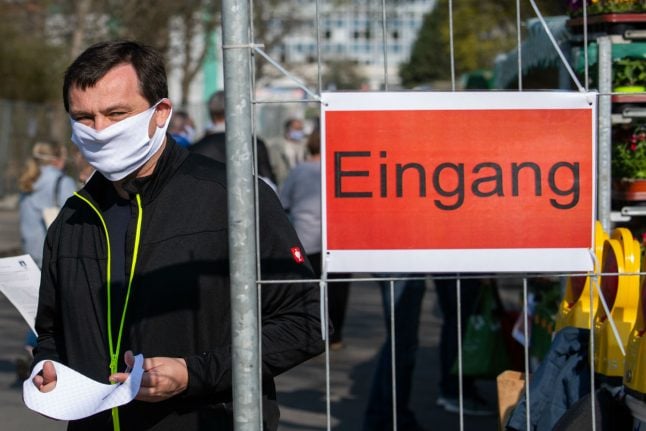“It is recommended that masks be used in public transport and while shopping,” Merkel told journalists after talks with regional leaders from Germany's 16 states.
According to Germany's Ministry of Health, wearing even a simple face mask could shield others from infection, especially as some people with coronavirus are not aware that they have the disease.
READ ALSO: 'Highly likely' that Bavaria will introduce face masks, says Bavarian state premier
Special masks such as the FFP2, which also protect the wearer, should be reserved for medical personnel, they said.
Minister of Economic Affairs, Peter Altmaier (CDU), recently stated that billions of masks – both for everyday use and medical personnel – are in demand within the country.
Yet supplies of especially high-quality masks are difficult to obtain due to a high demand worldwide.
Since the early afternoon, Merkel and state premieres have been discussing a roadmap that lays out which strict anti-corona measures such as school closures and contact restrictions can be gradually eased again.
READ ALSO: Germany set to extend coronavirus restrictions until early May
Making masks available

Markus Söder (CSU), state premier of Bavaria, stands with a face mask in a production hall of the automotive supplier Zettl on April 2nd. They are now producing face masks. Photo: DPA
According to consumer advocates, compulsory masks to combat the coronavirus should only be introduced if sufficient protective masks are available.
“If a mask is made mandatory for certain areas of life, they should also be in supply” Kai Vogel, health expert of the Federal Association of Consumer Centres (VZBV), told the Tagesspiegel on Wednesday.
“Politicians must ensure that protective masks are available nationwide before any easing of restrictions in public life takes place – and that personal protection is one of the conditions for such easing,” Vogel said.
Under no circumstances, however, should protective clothing be removed from other areas, such as the health and care sector, he added.
Federal Government Commissioner for the Disabled, Jürgen Dusel, advocated equipping certain risk groups with professional protective masks.
People who are particularly at risk of infection should be provided with appropriate FFP2 protective masks as soon as possible, “so that they can move freely in public spaces as required and, for example, go shopping or to work,” he said on Wednesday.

Many pharmacies around Germany, such as this one in Dortmund on March 21st, have signs that face masks and disinfectants are sold out. Photo: DPA
'Boost public life step by step'
Mecklenburg-Western Pomerania’s state premier Manuela Schwesig (SPD) has also spoken out in favour of a general obligation to wear masks if corona measures are relaxed.
“We will only be able to boost public life step by step. And we need additional measures such as face masks for everyone,” Schwesig told the newspaper Bild am Sonntag.
Considering that professional FFP2 masks are already in short supply for health care personnel, virologists like Christian Drosten also recommend cloths to cover mouth and nose.
In some cities in Germany where masks are already mandatory in public places – such as the eastern city of Jena – scarves and shawls are considered adequate protection for the mouth and nose.
READ ALSO: Jena becomes first German city to make wearing a face mask mandatory
With reporting from AFP.
Vocabulary
Obligation – (die) Pflicht
Supplies – (der) Nachschub
need/demand – (der) Bedarf
Availability – (die) Verfügbarkeit
We're aiming to help our readers improve their German by translating vocabulary from some of our news stories. Did you find this article useful? Let us know.



 Please whitelist us to continue reading.
Please whitelist us to continue reading.
Member comments